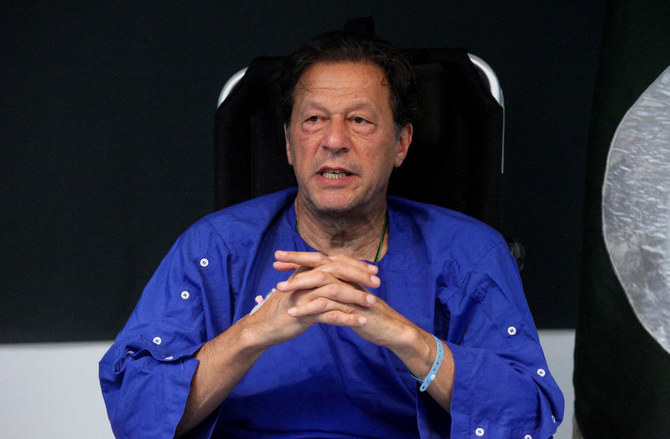ISLAMABAD: Pakistan’s media regulator banned broadcasts of former Prime Minister Imran Khan’s speeches as police arrived at one of his homes to deliver another court summons for the ousted premier, officials said Monday.
The development is the latest in a political tug of war between the former cricket star turned Islamist politician and the government of his successor, Shahbaz Sharif, as Khan campaigns for early elections.
The ban by the Pakistan Electronic Media Regulatory Authority was imposed on Sunday and went into effect on Monday. It covers airing of both recorded and live speeches by Khan, who was ousted in a no-confidence vote in Parliament last April. The ban followed a particularly fiery speech by Khan, who has a large grassroots following, lambasting Sharif’s government and the country’s all-powerful military.
Khan’s party, Pakistan Tehreek-e-Insaf, now in the opposition, denounced the ban. Fawad Chaudhry, a top party leader, told The Associated Press that the measure reflects the government’s “nervousness and fear” that Khan’s party would win the upcoming elections in two provincial assemblies.
The media regulator said it imposed the ban over what it described as baseless allegations by Khan against authorities and state institutions, a reference usually used for the military. It said Khan was spreading hate “against state institutions and officers, which is prejudicial to the maintenance of law and order.”
A violation of the ban by any media outlet would result in its license being revoked, the regulator said. Hours later, the private ARY TV channel was taken off air for airing Khan’s speech on Sunday. The rival Geo TV station’s anchor, Hamid Mir — a strong voice in support of media freedom and a victim of state-controlled censorship in recent years — slammed the action.
Earlier Sunday, police arrived at Khan’s home in the city of Lahore with an arrest warrant on suspicion that he had avoided appearing in court on charges of unlawfully selling state gifts he had received as prime minister and hiding assets from the election tribunal.
However, the police were told by Khan’s aides that was at his other home, in the capital of Islamabad. After the officers left the premises, Khan appeared outside the residence and delivered the speech cited for the ban. He spoke before cameras, accusing an unnamed army general of spearheading arrests of his party leaders in recent months.
The 70-year-old Khan has faced a string of charges from Sharif’s government, with several lawsuits launched against him. Last week marked his first appearance in court since he was shot in the leg by a gunman during a protest rally in November. He was answering summons on graft charges in a separate case against him.
After appearing in court in Islamabad last Tuesday, the judge approved bail in the case for Khan, months after police filed terrorism charges against him for allegedly inciting people to violence. The bail exempts him from appearing in court until a trial starts.
Khan has denied any wrongdoing and blames Sharif’s government of conspiring with the United States in his ouster. He has not offered any evidence for his claims and Washington and Sharif have denied the allegations.
In October, an elections tribunal disqualified Khan from holding public office and he was stripped of his seat in the National Assembly, the lower house of Parliament.
Also Sunday, Khan wrote to the country’s Supreme Court, requesting he be allowed to appear before courts through video links, purportedly because of threats to his life. In the appeal, Khan said there were 74 cases pending against him in various courts and that having to show up in person would further endanger him.
The standoff between Khan and Sharif’s government has roiled Pakistan as it struggles with a severe economic crisis. The country is currently in talks with the International Monetary Fund on how to revive a bailout program that was originally agreed on in 2019, when Khan was in power.
Pakistan bans media broadcasts of ex-PM Imran Khan speeches
Short Url
https://arab.news/nnyab
Pakistan bans media broadcasts of ex-PM Imran Khan speeches

- Latest in a political tug of war between the former cricket star turned politician and the government of his successor
- Media regulator says it imposed the ban over what it described as baseless allegations by Khan against authorities and state institutions













